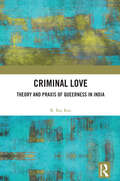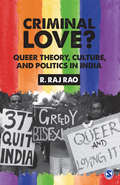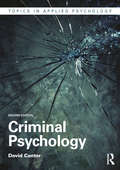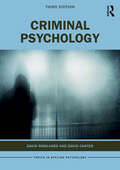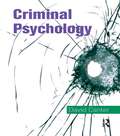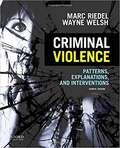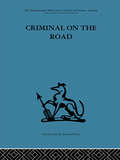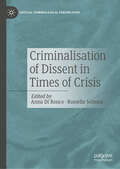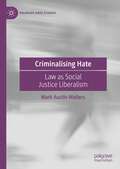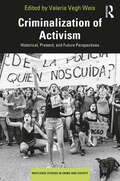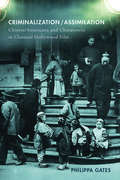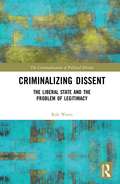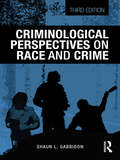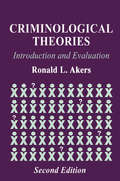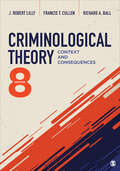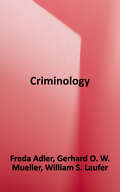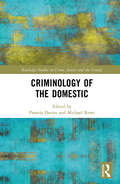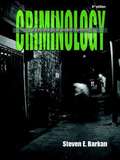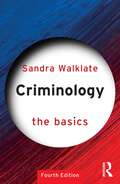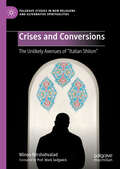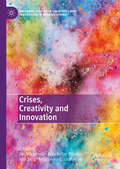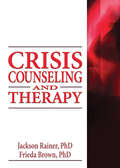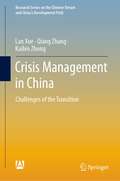- Table View
- List View
Criminal Love: Theory and Praxis of Queerness in India
by R. Raj RaoThis book takes up the challenge of studying the wide gamut of lived reality of the Indian queer, against the backdrop of a set of theories. Written by a man who has been openly gay for the last 40 years, it dissects issues, concepts, and theories within the realm of queer studies against the day-to-day experiences of Indian queers. Drawing from personal and shared experiences, it highlights the sites of transgression within a seemingly monosexual society and analyses the aspects of the struggle of being queer in a repressive environment.This book comprises of three fundamental aspects of queerness relevant to us in India today—theory, culture, and politics, which has been primarily analysed through literature and film. The literature here includes references to the author’s own work as a practicing writer, as well as to that of other contemporary writers. It is an attempt to delink alternative sexuality from gender and establish it as an autonomous category.This book would be useful to the students, researchers and teachers of women and gender studies, sociology, history, economics, political science, and other interdisciplinary courses in social sciences. It will also be valuable reading for those interested in South Asian studies, especially post-colonial contemporary Indian society.
Criminal Love?: Queer Theory, Culture, and Politics in India
by R Raj RaoCriminal Love? takes up the challenge of studying the wide gamut of lived reality of the Indian queer, against the backdrop of a set of theories. Written by a man who has been openly gay for the last 40 years, this book picks up issues, concepts, and theories within the realm of queer studies and dissects them against the day-to-day experiences of Indian queers. Digging deep into his own experiences and those of the people with whom he has come into contact, Rao highlights the sites of transgression within a seemingly monosexual society and analyzes all the aspects of the struggle of being queer in a repressive atmosphere.
Criminal Psychology (Topics in Applied Psychology)
by David CanterThis thoroughly updated and revised new edition provides an essential overview of a full range of psychological contributions to the understanding of crime and the processes of dealing with offenders and helping their victims. From the cognitive, developmental and social processes that influence a diverse range of crimes, including burglary, fraud, rape and murder, to the challenges faced by the police and courts in investigating crime or securing reliable testimony, the text is packed with pedagogical features that bring this fascinating subject to life. These include boxes highlighting key topics or issues around research methods, further reading and suggested essay titles. Also including chapters on rehabilitation in prisons and the psychology of victims, the text examines hot topics such as gang membership and terrorism, as well as discussing how psychology may better understand criminals and criminal behaviour in the future. It builds to a comprehensive and accessible introduction to the field. It will be ideal for students across psychology, criminology and socio-legal studies and law.
Criminal Psychology (Topics in Applied Psychology)
by David Canter David RowlandsThis carefully revised third edition of Criminal Psychology offers a vital, up-to-date account of the wide range of psychological contributions to the understanding of criminals and crime, its investigation, the legal processes of dealing with offenders, and helping victims.The book provides insights into cognitive, developmental, and social theories of a diverse range of crimes, including domestic abuse, burglary, fraud, rape, murder, and terrorism. It also discusses the psychological contributions to policing, criminal investigations, and court processes, and gives consideration to securing reliable testimony and rehabilitation in prisons. The third edition complements the topics established in earlier editions with the addition of current and emerging issues in the study of criminal psychology, including cybercrime, new forms of fraud, and developments in organised crime, as well as the future of crimes and their psychology. The well-illustrated text is packed with pedagogical features that bring this fascinating subject to life, including boxes highlighting key topics, descriptions of research methods, further reading, and suggested essay titles.Offering a comprehensive, accessible, contemporary introduction, the book shows that many aspects of psychology are essential for understanding criminals and their actions, the investigation of crime, and court procedures. This is the ideal text for students across psychology, criminology, socio-legal studies, and law, as well as everyone who wishes to gain an overview of criminal psychology.
Criminal Psychology: Topics in Applied Psychology
by David CanterTopics in Applied Psychology offers a range of accessible, integrated texts ideal for courses in applied psychology. The books are written by leading figures in their field and provide a comprehensive academic and professional insight into each topic. They incorporate a range of features to bring psychology to life including case histories, research methods, ethical debate and learner activities. Each chapter opens with learning objectives to consolidate key points. A reading list and sample essay questions at the end of chapters enable further independent study. The series also offers an appreciation of multiple perspectives, examines the relationship between psychology and other cognate disciplines and discusses recent developments in each field. Topics in Applied Psychology will provide you with the tools you need to engage with, enjoy and understand your applied psychology discipline, ultimately ensuring confidence and success in exams as well as a comprehensive grounding in the profession. Criminal Psychology examines the contributions that psychology is making to our understanding of criminals, the investigation of their crimes, processes in court and the management and treatment of offenders in prison. The psychological contributions to investigations are assessed with regard to interviewing and detecting deception as well as examining the nature and meaning of offender profiling. The role of psychologists as experts in court is reviewed followed by a look at how psychologists work with prisoners. The psychology of the victim is also examined. The book concludes with a discussion of the future of crime and the growing contribution that psychology is making to understanding criminals and reducing their activities. The integrated and interactive approach, combined with the comprehensive coverage, makes this book the ideal companion for courses in applied criminal psychology. Other books in this series include: Clinical Psychology, Educational Psychology, Health Psychology, Organizational and Work Psychology and Sport and Exercise Psychology.
Criminal Violence: Patterns, Explanations, and Interventions
by Marc Riedel Wayne WelshCriminal Violence: Patterns, Explanations, and Prevention, Fourth Edition, provides a current, comprehensive, and highly accessible overview of major topics, theories, and controversies within the field of criminal violence. <P><P> Using engaging, straightforward language, Marc Riedel and Wayne Welsh consider diverse theoretical perspectives and present state-of-the-art prevention and intervention methods. In their discussions of various types of violence, the authors employ a consistent and coherent three-part framework that allows students to see the important relationships between research, theory, and application.
Criminal on the Road: A Study of Serious Motoring Offences and Those Who Commit Them (International Behavioural And Social Sciences Ser. #Vol. 25)
by T. C. WillettTavistock Press was established as a co-operative venture between the Tavistock Institute and Routledge & Kegan Paul (RKP) in the 1950s to produce a series of major contributions across the social sciences. This volume is part of a 2001 reissue of a selection of those important works which have since gone out of print, or are difficult to locate. Published by Routledge, 112 volumes in total are being brought together under the name The International Behavioural and Social Sciences Library: Classics from the Tavistock Press. Reproduced here in facsimile, this volume was originally published in 1964 and is available individually. The collection is also available in a number of themed mini-sets of between 5 and 13 volumes, or as a complete collection.
Criminalisation of Dissent in Times of Crisis (Critical Criminological Perspectives)
by Anna Di Ronco Rossella SelminiThis book provides a wide-ranging, global exploration of policies and practices which have sought to undermine dissent during recent and less recent social, political, economic and health ‘crises’. Examining various cases of activism and opposition from both the Global North and the Global South, and drawing on multi-disciplinary insights, this book analyses the many ways in which state and non-state actors have targeted dissent, activism and protest, including by vulnerable groups. This includes strategies that have silenced dissenting opinions, restricted the right to protest, intensified policing practices and the surveillance of activists, imposed onerous administrative fines, criminalised and prosecuted dissenters, and even killed activists. Fundamentally, this volume considers ‘criminalisation’ as a process that develops on a continuum of control and repressive practices that aim to undermine dissent. It contributes to the broader discussion on criminalisation processes, policing, the rule of law, and the quality of our democracies.
Criminalising Hate: Law as Social Justice Liberalism (Palgrave Hate Studies)
by Mark Austin WaltersThis book presents both a new theoretical framework for the criminalisation of hate, referred to as “law as social justice liberalism”, and a comprehensive analysis of hate crime laws that have been enacted globally. The book begins by reflecting back on 30 years of theorisation on hate crime laws, arguing that there has been a failure to adequately capture the distinct harms of hate-based criminal conduct within legal frameworks. The book posits that liberal societies interested in advancing social equality ought to expand conventional paradigms of harm used in criminal law by comprehending hate-based conduct as a form of social injustice. Drawing on the work of Iris Young, the book sets out a comprehensive analysis of the harms of hate crime as a form of group-based oppression and uses this to set out criteria for the inclusion of protected characteristics under legislation.The second half of the book presents findings from a comparative study of hate crime laws enacted in 190 different legal jurisdictions. This includes a new taxonomy of types, models and legal tests used by legislatures to capture the myriad forms of hate-based criminal conduct that occur globally. Further evaluation of case law and empirical research on the application of these diverging legislative approaches is used to provide recommendations on how legislators ought to construct hate crime laws. The book completes its analysis of law as social justice liberalism by synthesising law, punishment and restorative justice as a means of ensuring that liberal systems of “justice” are more firmly anchored to the advancement of “social justice”.
Criminalization of Activism: Historical, Present and Future Perspectives (Routledge Studies in Crime and Society)
by Valeria Vegh WeisCriminalization of Activism draws on a multiplicity of perspectives and case studies from the Global South and the Global North to show how protest has been subject to processes of criminalization over time. Contributors include scholars and activists from different disciplinary backgrounds, with a balance between authors from the Global North and the Global South. An introduction frames the topic within critical criminology, while also highlighting the possible disciplinary approaches and definitions of criminalization of resistance/activism. The editor also investigates the particularities of the current times in comparison to dynamics of criminalization in prior stages of capitalism. Bringing together a range of criminalization themes into a single volume, compromising historical criminology, Indigenous studies, gender studies, critical criminology, southern criminology and green criminology, it will be of great interest to scholars and students of criminology, social movement theory and social sciences, as well as those involved in activism and with a stand against criminalization.
Criminalization/Assimilation: Chinese/Americans and Chinatowns in Classical Hollywood Film
by Philippa GatesCriminalization/Assimilation traces how Classical Hollywood films constructed America’s image of Chinese Americans from their criminalization as unwanted immigrants to their eventual acceptance when assimilated citizens, exploiting both America’s yellow peril fears about Chinese immigration and its fascination with Chinatowns. Philippa Gates examines Hollywood’s responses to social issues in Chinatown communities, primarily immigration, racism, drug trafficking, and prostitution, as well as the impact of industry factors including the Production Code and star system on the treatment of those subjects. Looking at over 200 films, Gates reveals the variety of racial representations within American film in the first half of the twentieth century and brings to light not only lost and forgotten films but also the contributions of Asian American actors whose presence onscreen offered important alternatives to Hollywood’s yellowface fabrications of Chinese identity and a resistance to Hollywood’s Orientalist narratives.
Criminalizing Dissent: The Liberal State and the Problem of Legitimacy (The Criminalization of Political Dissent)
by Rob WattsWhile liberal-democratic states like America, Britain and Australia claim to value freedom of expression and the right to dissent, they have always actually criminalized dissent. This disposition has worsened since 9/11 and the 2008 Great Recession. This ground-breaking study shows that just as dissent involves far more than protest marches, so too liberal-democratic states have expanded the criminalization of dissent. Drawing on political and social theorists like Arendt, Bourdieu and Isin, the book offers a new way of thinking about politics, dissent and its criminalization relationally. Using case studies like the Occupy movement, selective refusal by Israeli soldiers, urban squatters, democratic education and violence by anti-Apartheid activists, the book highlights the many forms dissent takes along with the many ways liberal-democratic states criminalize it. The book highlights the mix of fear and delusion in play when states privilege security to protect an imagined ‘political order’ from difference and disagreement. The book makes a major contribution to political theory, legal studies and sociology. Linking legal, political and normative studies in new ways, Watts shows that ultimately liberal-democracies rely more on sovereignty and the capacity for coercion and declarations of legal ‘states of exception’ than on liberal-democratic principles. In a time marked by a deepening crisis of democracy, the book argues dissent is increasingly valuable.
Criminological Perspectives on Race and Crime
by Shaun L. GabbidonIdeal for use in either crime theory or race and crime courses, this is the only text to look at the array of explanations for crime as they relate to racial and ethnic populations. Each chapter begins with a historical review of each theoretical perspective and how its original formulation and more recent derivatives account for racial/ethnic differences. The theoretical perspectives include those based on religion, biology, social disorganization/strain, subculture, labeling, conflict, social control, colonial, and feminism. The author considers which perspectives have shown the most promise in the area of race/ethnicity and crime.
Criminological Perspectives on Race and Crime (Criminology and Justice Studies)
by Shaun L. GabbidonCriminological Perspectives on Race and Crime, Fourth Edition, is the only text to look at the array of mainstream and unconventional explanations for crime as they relate to racial and ethnic populations. Each chapter begins with a historical review of each theoretical perspective and how its original formulation and more recent derivatives account for racial or ethnic differences in offending. Included in each chapter is a review of relevant empirical tests that have investigated the value of that theory. The theoretical paradigms include those based on religion, biology, social disorganization/strain, subculture, labeling, conflict, social control, colonial, feminism, and race-centered perspectives. Gabbidon considers which perspectives have shown the most promise in explaining the relationships between race/ethnicity and crime. Ideal for courses in either crime theory or race and crime, this text is used in Criminology and Sociology programs in the US as well as in the UK and Canada.
Criminological Theories: Introduction and Evaluation
by Ronald L. AkersIn Criminological Theories, the noted criminologist Ronald Akers provides thorough description, discussion, and appraisal of the leading theories of crime/delinquent behavior and law/criminal justice - the origin and history of each theory and its contemporary developments and adherents.Akers offers a clear explanation of each theory (the central concepts and hypotheses of each theory as well as critical criteria for evaluating each theory in terms of its empirical validity).Researchers and librarians, as well as general readers, will find this book a very useful tool and will applaud its clear and understandable exposition of abstract concepts.
Criminological Theory: Context and Consequences
by Francis T. Cullen J. Robert Lilly Richard A. BallOffering a rich introduction to how scholars analyze crime, Criminological Theory: Context and Consequences moves readers beyond a commonsense knowledge of crime to a deeper understanding of the importance of theory in shaping crime control policies. The Eighth Edition of this clear, accessible, and thoroughly revised text covers traditional and contemporary theory within a larger sociological and historical context. The latest edition includes new sources that assess the empirical status of the major theories, a new chapter on Black Criminology, and expanded coverage of important perspectives, such as the explanation of white-collar crime and the relationship of immigration and crime. Included with this title: LMS Cartridge: Import this title′s instructor resources into your school′s learning management system (LMS) and save time. Don′t use an LMS? You can still access all of the same online resources for this title via the password-protected Instructor Resource Site. Learn more.
Criminological Theory: Context and Consequences
by Francis T. Cullen J. Robert Lilly Richard A. BallOffering a rich introduction to how scholars analyze crime, Criminological Theory: Context and Consequences moves readers beyond a commonsense knowledge of crime to a deeper understanding of the importance of theory in shaping crime control policies. The Eighth Edition of this clear, accessible, and thoroughly revised text covers traditional and contemporary theory within a larger sociological and historical context. The latest edition includes new sources that assess the empirical status of the major theories, a new chapter on Black Criminology, and expanded coverage of important perspectives, such as the explanation of white-collar crime and the relationship of immigration and crime. Included with this title: LMS Cartridge: Import this title′s instructor resources into your school′s learning management system (LMS) and save time. Don′t use an LMS? You can still access all of the same online resources for this title via the password-protected Instructor Resource Site. Learn more.
Criminology
by Freda Adler Gerhard O. W. Mueller William S. LauferCriminology is a young discipline. In fact, the term "criminology" is only a little more than a century old. But in this brief time, criminology has emerged as an important social and behavioral science devoted to the study of crime and criminal behavior, and the society's response to both. <p><p>Criminology fosters theoretical debates, contributes ideas and constructs, develops and explores new research methodologies, and suggests policies and solutions to a wide range of crime problems that dramatically affect the lives of countless people in the United States and around the world. Problems as vital and urgent as those addressed in this book are challenging, exciting, and, at the same time, disturbing and tragic. Moreover, these problems are immediately relevant to all of our lives. This is especially true today, when crimes here and abroad touch so many lives, in so many ways. <p><p>Our goal with this book has been, and remains, to discuss these problems, their origins, and their possible solutions in a clear, practical, straightforward fashion that brings the material to life for students. We invite faculty and students alike to join the authors' in traveling along criminology's path, exploring its expanding boundaries, and mapping out its future.
Criminology of the Domestic (Routledge Studies in Crime, Justice and the Family)
by Pamela Davies Michael RoweBringing together a range of perspectives, this book establishes a criminology of the domestic, paying particular attention to emerging spatial and relational reconfigurations. We move beyond criminologies of public and urban domains to consider over-looked non-public locales, and crimes and harms that occur in the home and other private spaces. Developed in the context of the COVID-19 lockdowns, where distinctions between public and private became increasingly untenable, the book considers how the pandemic has accelerated new patterns of behaviour, enabled by technology and shifting social relations.Drawing on a range of criminological topics, including victimisation, offending, property and violent crime, consumption, deviance and leisure, and zemiology, the book argues that the domestic sphere, and its relation to the public realm, needs to be more carefully conceptualised if criminology is to respond to new spatial and relational dimensions of changing lifestyles.An accessible and compelling read, this book will appeal to students and scholars of criminology, sociology, politics, geography, history, gender, surveillance and security, and all those interested in a criminology of the domestic sphere.
Criminology: A Sociological Understanding (Sixth Edition)
by Steve E. BarkanCriminology: A Sociological Understanding, 6e, provides a sociological perspective on crime and criminal justice by treating social structure and social inequality as central themes in the study of crime—and major factors in society's treatment of criminals. It gives explicit attention to key sociological concepts such as poverty, gender, race, and ethnicity, and demonstrates their influence on crime. Moving beyond simple “get tough” approaches, the book emphasizes the need to understand social causes of criminal behavior in order to significantly reduce it.
Criminology: The Basics (The Basics)
by Sandra WalklateThe fourth edition of Criminology: The Basics has been fully revised and updated to offer an engaging and concise introduction to the main themes and concerns of this compelling and complex subject and gives an overview of the main theoretical and conceptual approaches to crime and justice. Topics covered include:• the history and development of criminology,• myths about crime and offenders,• the search for criminological explanation,• victims of crime and state crime,• crime prevention and the future of crime control,• criminology and intersectionality.The new edition has been expanded to include discussion of emerging themes in criminology, including the debates surrounding decolonizing the curriculum, the emergence of digital criminology and its impact on crime control and prevention, as well as ongoing scrutiny on violence against women. Authoritative and accessible, this book offers chapter summaries, exercise questions, and lists of further reading to provide a perfect introduction to this subject.
Crises and Conversions: The Unlikely Avenues of "Italian Shiism" (Palgrave Studies in New Religions and Alternative Spiritualities)
by Minoo MirshahvaladThis book explores the phenomenon of conversion to Shi'a Islam in Italy. It thoroughly examines the motivations behind this religious transition and scrutinizes the doctrinal characteristics that Shiism incorporates thanks to the contributions of Italian converts. The text emphasizes the significance of René Guénon’s Traditionalism as a pivotal factor in driving this religious mobility. Additionally, the book delves into the writings of figures such as Julius Evola, who introduced Guénon to Italy, shedding light on Evola’s impact on the youth in the post-World War II era. Furthermore, it evaluates the influence of Henry Corbin on this spiritual journey. To realize this study, between 2018 and 2023, Minoo Mirshahvalad employed multidisciplinary methods that integrated sociology and history.
Crises, Creativity and Innovation (Palgrave Studies in Creativity and Innovation in Organizations)
by Roni Reiter-Palmon Min Tang Zorana Ivcevic Magdalena G. GrohmanThis book aims to provide a better understanding of the different practices of creativity and innovation under crisis situations. Drawing on theories and studies by scholars in psychology, education, and organizational behavior, this edited collection brings together renowned international experts to explore the active and reactive adaptations to the transformations caused by crises. It discusses how abrupt changes in personal, social, political, economic, or environmental affairs are an integral part of our individual and social lives, which drive people and organizations to adapt and change. With flexibility, adaptability, and problem-solving at the core of its nature, creativity and innovation have the potential to help people cope with harsh and uncertain circumstances caused by crises. This book delves into the positive relationship between the experience of crisis and creativity and innovation, presenting theoretical inquiries, empirical studies, and their practical implications for a constructive shift in crisis management, coping mechanisms, and individual and societal wellbeing. A must read for researchers in psychology, philosophy, sociology, economy and politics, interested in crisis and disaster studies.
Crisis Counseling and Therapy
by Jackson Rainer Frieda BrownComprehensive instruction in this important method From Pearl Harbor to the events of September 11, 2001, to the ravages of Hurricane Katrina, tragedy can leave indelible scars. Its many forms are now visibly present in our local, national, and international communities. Intervention, as a clinical technique to combat the debilitating effects of stress that accompany crisis, is quickly becoming a social movement. Crisis Counseling and Therapy provides comprehensive instruction in this important and rapidly burgeoning field with a systemic three-phase method that is simple and practical. This innovative model can easily be incorporated into the clinician&’s practice to provide effective, strategic intervention. Crisis Counseling and Therapy recognizes that no single theory or strategy will prove useful in all situations and so offers students and professionals an adaptable approach to dealing with any crisis they may confront. By integrating four proven theories-narrative, cognitive-behavioral, family systems, and experiential/existential-and using the degree of disequilibrium experienced in the system to determine therapy sessions, this unique text presents a new approach to crisis work. In-depth, contemporary case studies and an easily-learned and -implemented model of application allow for multidisciplinary approaches to treatment and more positive, constructive outcomes. Topics covered in Crisis Counseling and Therapy include: definitions of crisis critical moments of development characteristics of the crisis counselor contemporary standards and models of practice models for intervention assessment models models of treatment justification for a new model of treatment-restoration of functioning integrating the four unique approaches profile of an individual in crisis the systemic crisis intervention model the model&’s three phases: Remember, Reorganize, Restore integrating the stress of crisis and many more! A vital text, reference, and resource manual, Crisis Counseling and Therapy is ideal for students and established professionals as well as clinicians and specialists working in the fields of psychiatry, psychology, social work, nursing, organ donor procurement, first responder personnel, ministry, emergency medicine, and managed care who are seeking continuing education.
Crisis Management in China: Challenges of the Transition (Research Series on the Chinese Dream and China’s Development Path)
by Qiang Zhang Lan Xue Kaibin ZhongThis book describes various crisis situations in transitional China, and by analyzing the unique characteristics and backgrounds of emergencies and crisis, it argues that crisis management has become a major challenge for the Chinese governments. It then discusses the chronology of crisis, organizational behaviors and the decision-making processes to construct a modern crisis management system in detail, to shed light on the creation of a strategic design and institutional framework of crisis management in China. In so doing, it provides not only insights into the dynamics of crisis decision-making and communication, but also solutions for possible problems specific to a transitional political regime in China.
